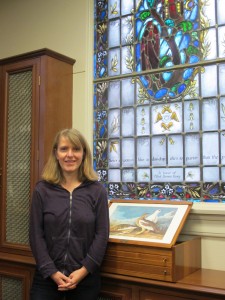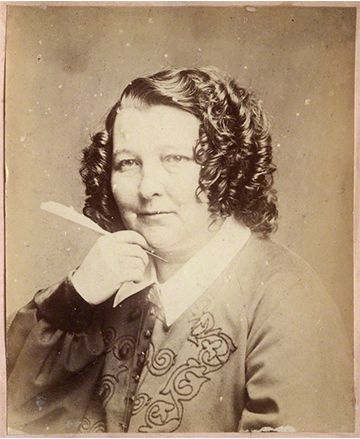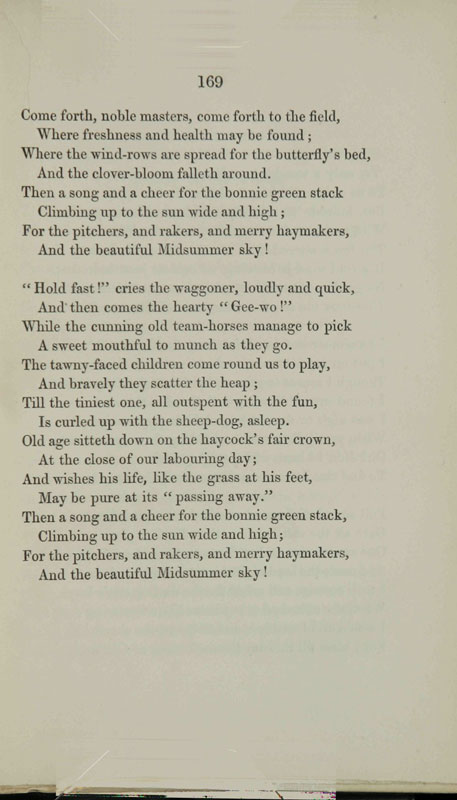By Fabienne Moine, Senior Lecturer at Paris Ouest Nanterre la Défense, France
I have been very lucky to be a Visiting Scholar to the Armstrong Browning Library for the third time. During my first visit in 2007, just after completing my PhD on Elizabeth Barrett Browning’s poetical works, my project was to study the poet’s literary and cultural connexions with other female poets of her time. I had the good fortune to share my interest for female poets with Cynthia Burgess, Curator of Books and Printed Materials, who helped me discover and explore what has become my main field of research since then: Victorian women’s poetry, and in particular poems by non-professional and working-class women. In 2007, ABL had already collected more than 200 books of poetry written by women in English and published from 1800 to 1900. Being immediately bitten by the poetry bug, I developed an insatiable curiosity for poems by Victorian women. While reading most of the poetry books from this collection and growing familiar with all sorts of poets from very different social and geographical backgrounds, I became aware that a noticeable number of them were addressing gender-related issues on a recurring basis, either to support the preservation of heteronormative gender roles or to debunk patriarchal hegemony. Most of the time the poems presented an ambivalent position between renunciation and denunciation. Indeed it remains a conundrum for today’s readers to decipher the real message of Adelaide Procter (1825-1864) in her poetical trilogy “A Woman’s Question” (1858), “A Woman’s Answer” (1861) and “A Woman’s Last Word” (1861).
“A Woman’s Question”
Before I trust my fate to thee,
Or place my hand in thine,
Before I let thy future give
Color and form to mine,
Before I peril all for thee, question thy soul to-night for me.I break all slighter bonds, nor feel
A shadow of regret:
Is there one link within the Past
That holds thy spirit yet?
Or is thy faith as clear and free as that which I can pledge to thee?Does there within thy dimmest dreams
A possible future shine,
Wherein thy life could henceforth breathe,
Untouched, unshared by mine?
If so, at any pain or cost, O, tell me before all is lost.Look deeper still. If thou canst feel,
Within thy inmost soul,
That thou hast kept a portion back,
While I have staked the whole;
Let no false pity spare the blow, but in true mercy tell me so. (Lines 1-20)
Are these poems invitations for women to fly with their own wings or to reintegrate into the domestic sphere after a magical interlude? Similarly, is “Japanese Fan” (1888) by Margaret Veley (1843-1887) preserving female sociability or hiding women’s real secrets?
‘While she spoke and while her slender
Hands would toy
With her fan, which as she swayed it
Might have been
Fairy wand, or fitting scepter
For a queen.
When she smiled at me, half pausing
In her play,
All the gloom of gathering twilight
Turned to day!Though to talk too much of heaven
Is not well—
Though agreeable people never
Mention hell—
Yet the woman who betrayed me—
Whom I kissed—
In that bygone summer taught me
Both exist.
I was ardent, she was always
Wisely cool,
So my lady played the traitor,
I—the fool’——
Oh, your pardon! But remember
If you please,
I’m translating—this is only
Japanese.‘Japanese?’ you say, and eye me
Half in doubt;
Let us have the lurking question
Spoken out.
Is all this about the lady
Really said
In that little square of writing
Near her head?
I will answer, on my honour,
As I can,
Every syllable is written
On the fan.
Yes, and you could learn the language
Very soon—
Shall I teach you some August
Afternoon? (Lines 139-180)
Encountering dozens of comparable cases, I realized that I could show how women devised regular poetical strategies while they renegotiated woman’s position and the social codes of gentility and gender. This widened perspective on women poets led me to complete my first study (in French) of the cross-fertilisation of genre and gender in Victorian women’s poetry, Le genre en jeu: Poésie et identité féminines en Angleterre 1830-1900 (Paris: L’Harmattan 2010).
In 2011, I returned to ABL to further my research on women poets of the nineteenth century, choosing this time to concentrate on nature and science-related poems. With the nineteenth-century women poets collection growing fast, more than 300 poetry books were made accessible. I rapidly came across unexpected poets, such as Isabella Southern (dates unknown), whose devotional poems skilfully integrate the scientific knowledge of her time; working-class Mrs. D.H. Gordon (aka “Violet”, dates unknown) who makes use of the fairy in the garden to suit her democratic ideal in “A Fairy Palace”, a poem about a city garden, probably Pittencrieff Park in Dunfermline:
“A Fairy Palace”
I know a fairy palace
(‘Tis a greenhouse through the day),
There’s no moat, and no portcullis,
No seneschal, old and grey;
But there, at night, Queen Mab
Of late has taken her stay.‘Tis in middle of a garden,
In a pleasant neighbourhood;
It has a gate and warden,
As a fairy palace should;
To see it and its surroundings
Would do any cynic good.Round the round table, holly green,
At midnight on the clock,
You may behold the fairy queen
And all her elfin folk;
But I forgot, they are unseen
To all who go to mock. (Lines 1-18)
I also encountered “Sims” and “Prima Donna”, two cats whose operatic talents, wittily described by Alice E. Argent (dates unknown), tell much about the poet’s view of the flaws of the class system of her day:
“Prima Donna”
Let others boast their singers fine—
Sims Reeves and Mary Davies,—
I know a greater far than these
A little ‘rara avis!’She equals Santley’s purest notes,
Albani’s tuneful measure,
E’en Titiens cannot vie with her
Or give me half such pleasure.For me she sits and sings all day,
A song that none can capture,
It is so fairy-like and low,
Yet, full of careless rapture.Then can you wonder that my heart
Should fondly dote upon her,
And that within my world she stands
The only Prima Donna!But you would like to know her name,
If she be young and pretty?
I think her both, but you don’t know
My dainty Persian Kitty!Such eyes she has of golden brown,
As if the sun had caught them,
Like shining lamps—as if some sprite
With fire had made and wrought them.And then what singer on the stage,
Dressed finely in the fashion,
Can rival her soft velvet fur
And gaze of wayward passion?Or own a football half as light
With cushioned feet so tender,
And little ears so quaintly set
Upon a headpiece slender.For me she sings with ne’er a thought
For money or for praises:
Oh! may her grave when she doth die
Be crowned with simple daisies.Of cats she is the cat of cats,
The “Empress” is her title,
But hark! will any one take seats,
She’s giving a recital!!
And what about Mrs Louisa Campbell (dates unknown) who is guiding her young readers into deciphering the mysteries of nature, therefore improving both their knowledge of the natural world and their capacity to do good?
“Introduction”
There are voices in the earth and air,
In the river and the sky,
In all things that are bright and fair,
In all that live or die.
There are voices in the garden flowers,
And in the wilding tribe,
In mosses that carpet winter hours,
And pleasant thoughts inscribe
Upon the path we chill-ly tread,
In our dreariest time of year,
When gayer beauties all have fled,
Or died of cold and fear.
Each has some story to relate,
Each has some tale to tell,
And children, it has been my fate
To know, love stories well.
Things speak not audibly ‘tis true,
But all have sculptured thought,
Or characters as plain to view,
If only they are sought.
Then let us wander through the wood,
Stroll onward far and nigh,
For unto him who learns to read,
Their pages open lie.
And we will ask things what they say.
Wherever we may go;
Thus doubtless, we shall every day,
Some little story know.
No doubt the Chartist poet Eliza Cook (1818–1889) is a case in point when one looks for the combination of social commitment and natural discovery. “The Song of the Seaweed” or “The Song of the Worm” are humorous poems, not without a certain healthy dose of cynicism, denouncing human cupidity and selfishness:
“Song of the Seaweed”
I am born in crystal bower,
Where the despot hath no power
To trail and turn the oozy fern,
Or trample down the fair sea-flower.
I am born where human skill
Cannot bend me to its will;
None can delve about my root,
And nurse me for my bloom and fruit;
I am left to spread and grow
In my rifted bed below,
Till I break my slender hold,
As the porpoise tumbleth o’er me,
And on I go—now high—now low—
With the ocean world before me. (Lines 1-14)
While exploring animal poetry, I found genuine poetical treasures such as Violet Fane (1843-1905)’s ” ‘Somebody’s Darling’ ” (1900), certainly alluding to Marie La Coste’s extremely popular memorial to the soldiers who fell during the American Civil War, but the “Darling” in Fane’s poem is a dusty stuffed dog kept in a Wardian case and waiting for some spendthrift client to have a crush on it:
“Here’s the very thing! I had nigh forgot!…
Just as good as new, in a splendid frame,
And so like real that I call him ‘Spot,’
As one never can know his proper name.”
And he took from a shelf in a secret place
A little stuff’d dog in a cracked glass case.“You’re so fond of dogs, and I make no doubt
That this one has been a regular pet,—
There’s a stain on his collar that won’t come out,
But the bell’s real silver, and tinkles yet.
And then look at the sense in his head and his face;
Why, he’s just like Shakespeare in Hamilton Place!“And observe the fire that he’s got in his eyes!
And they’re both of a most expensive make—
At the Crystal Palace he’d win a prize
For his eyes alone, and he’d ‘take the cake’
From all the rest! You may mark my word
He’s an animal fit to belong to a lord!“…His hair comes off?…Why, of course it do!…
And so would yours in a place like this!
But just you take him and comb him through,
And pat him, and pet him, and give him a kiss;
And he’ll grow in beauty ever so much,
And get quite life-like under your touch!”So he rattled on: “See his tail,—that pert!…
He’s the prettiest creature you ever saw,
Worth his weight in gold, and as cheap as dirt;
And look at the turn of that right-hand paw,
Held out so natural,—ready to shake,—
He’s been somebody’s darling and no mistake! (Lines 55-84)
My second visit to the ABL helped me deepen my knowledge in nature poetry, as I read hundreds of animal poems, flower poems, science poems, garden poems… With this almost limitless reserve of poems in my pocket, I completed my second book, this time in English, under the title Women Poets in the Victorian Era: Cultural Practices and Nature Poetry (Ashgate, due November 2015).
Returning to ABL in 2015, I have pursued a new research project that aims to explore more animal poems and to see how they address contemporary social issues such as vivisection, isolation, domestic violence, and the fear of the Other. I also examine how women use animal poetry to engage in religious questions such as the possible existence of an animal soul; and also how they contribute to the scientific debate following Darwin’s theory of evolution. While examining whether some animal poems challenge the normative cultural practices of the middle-class family, I look at how petkeeping is illustrated in poems, for example in animal biographies and autobiographies in verse – such as those of Ann Dorset (1753-1816) or Eliza Cook. I focus my attention on dogs in particular as I am concentrating on poems about pedigree and breeding – even if curs remain Victorian women poets’ favourites. I have come across some unusual but very funny pieces of poetry, though they deal with the very serious issue of battered women. “Monsieur Henry and His Dog” (1894) by Mrs Murray (Joanna Gregory Laing, 1823-1883?) is about a gentleman who is warned against treating his wife as he does his dog:
How d’ you do, Monsieur Henry? I hope you are well;
And how is Don Carlo, that wonderful swell?
I see in the park he is not to be seen,
And fear that at home he is ill with the spleen.I hope that your treatment of him is judicious:
Is over-indulgence not making him vicious?
You cherish for him, sir, the highest opinion,
Although ’tis a truth he’s your foundling and minion.When I saw Monsieur Carlo, your joy and your pride,
Just wander a moment in sport from your side,
I thought when your blows to your friend were so rife,
It is thus you would manage a beautiful wife.Let me put you in mind how the mother of Byron,
By coaxing and beating did ruin her son,
This hour was a virtue which next was a sin;
Thus she made him unfit for the world he was in. (Lines 1-16)
“The Nightingale and the Pig” (1841), a fable by Elizabeth Sherwin (dates unknown) describes a very improbable and unsuccessful interspecies union, the pig treating the nightingale violently:
The fated nightingale grew sad,
And pined, though all around was glad;
She sighed, with aching heart, to be
As erst, unshackled, wild and free.
How ardently she longed to fly,
And skim again the clear blue sky,—
To gain once more her native bower,
And taste the sweets of mead and flower;
But firm was tied old Hymen’s knot,
Fluttering and struggling mattered not,—
It never made her woes the lighter,
And only pulled the noose still tighter.
No soft companion of her kind,
Was ever near to sooth her mind;
All—all had flown—affrighted by
The growling hog’s brutality,
At each complaint the songster uttered,
Pig only grunted, kicked and sputtered.
Quickly the gentle creature’s song
Was hushed, and as time rolled along,
She grieved alone, unseen, unheard,
A drooping solitary bird.
But soon the welcome hand of death
Received her last faint parting breath;
Like shadows at the close of day,
She sickened, faded, pass’d away.Moral
Ye gentle maids, who now regard
A single state as very hard,
And with a husband hope to find
More bliss of heart, more peace of mind,
Be cautious how you choose a mate—
Scan well to whom you link your fate:
Avoid the strutting, whiskered elf,
Who blusters and extols himself,
Who visits inns each night, and swears;
Love’s eating, drinking, and cigars;
Or to repent you’ll never fail,—
Be wise,—think of the nightingale. (Lines 107-144)
The two poets’ feminist views are exposed in a very efficient way as animal poetry gives strength to their denunciation of domestic oppression and violence.
Digital humanities have considerably contributed to facilitate access to precious information previously reserved for a chosen few. Since my first visit in 2007, most women’s poetry books have been indexed and fully digitized, offering access to 467 works so far. Access from afar to these wonderful pieces of poetry is extremely valuable: now poems about dogs, peacocks, birds of passage or dormice are served on a silver platter to distant scholars. This being said, there is nothing like holding an old poetry book, gently turning its pages, feeling the quality of the paper and even indulging in the smell of rare books. And, far more important, is the kindness of the ABL staff, always making sure you conduct your research in the best possible way and consistently making themselves available to help you find the perfect gem.
To learn more about the Armstrong Browning Library’s Visiting Scholars Program, visit our website.




